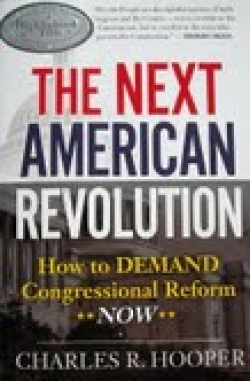The Next American Revolution
How To Demand Congressional Reform Now
The United States Congress has been reduced to a partisan body of bickerers, controlled by special interest groups, in which members are more concerned about their re-elections, perks, and power than they are about serving their constituents, claims the author. His remedy is for the states to call an amendment convention, as described in Article Five of the Constitution. This is not a radical screed calling for the overthrow of the government, but rather a well-conceived plan that would result in a peaceful revolution and make Congress responsive to the public.
The author is a hospital social worker and has much experience as an advocate for his clientele. Likely, his role as a “professional advocate” informs this sensible, concise blueprint for congressional reform. This reviewer does not share the author’s optimism that the public would form the dedicated grassroots movement necessary to convince their state legislators to call an Article Five Convention. Amendments passed to reform Congress at such a convention must be approved by three-fourths (or thirty-eight) of the states to become part of the Constitution. Public concerns about jobs and the economy might take priority, and congressional power—for better or worse—is likely too entrenched to be reigned in. (A classic example of the foxes guarding the henhouses.)
However, Hooper might ultimately be proven right and his analysis and suggested changes are worthy of consideration by all people concerned about the current state of Congress. The author calls for new constitutional amendments: the 28th would impose term limits of twelve years total on congressmen and senators, the 29th would require that all campaign funding come solely from individual citizens, and the 30th would reduce the number of congressional districts in each state to one or three.
The author does not offer his plan as the ultimate cure-all for Congress, an institution clearly in need of repair, but rather as a springboard for further dialogue and public action. Much of what Hooper says make sense, notably that congressional districts are too large, that state governments have been increasingly burdened by unfunded federal government mandates, and that Article Five may be the key to congressional reform. Readers might not agree with all that the author proposes, but will likely be impressed by his passionate commitment to this cause and the public’s role in making it happen.
Reviewed by
Karl Helicher
Disclosure: This article is not an endorsement, but a review. The publisher of this book provided free copies of the book and paid a small fee to have their book reviewed by a professional reviewer. Foreword Reviews and Clarion Reviews make no guarantee that the publisher will receive a positive review. Foreword Magazine, Inc. is disclosing this in accordance with the Federal Trade Commission’s 16 CFR, Part 255.

